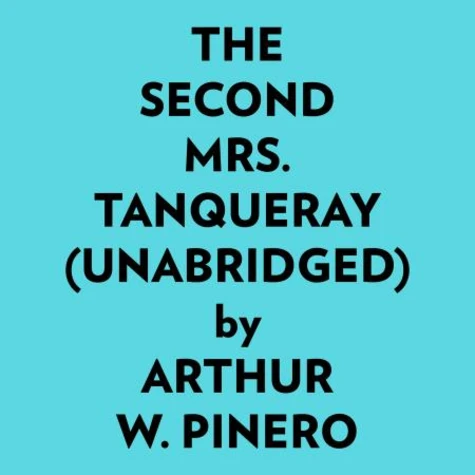The Second Mrs. Tanqueray (Unabridged)
Par : ,Formats :
Disponible dans votre compte client Decitre ou Furet du Nord dès validation de votre commande. Le format MP3 est :
- Pour les liseuses autres que Vivlio, vous devez utiliser le logiciel Adobe Digital Edition. Non compatible avec la lecture sur les liseuses Kindle, Remarkable et Sony
 , qui est-ce ?
, qui est-ce ?Notre partenaire de plateforme de lecture numérique où vous retrouverez l'ensemble de vos ebooks gratuitement
Pour en savoir plus sur nos ebooks, consultez notre aide en ligne ici
- FormatMP3
- ISBN978-1-6693-7572-2
- EAN9781669375722
- Date de parution07/04/2022
- Protection num.pas de protection
- Taille320 Mo
- Infos supplémentairesaudio
- ÉditeurEverest Media LLC
Résumé
Please note: This audiobook has been created using AI voice.
Arthur Pinero wrote The Second Mrs. Tanqueray in 1893 after penning several successful farces. Playing on the "woman with a past" plot that was popular in melodramas, Pinero steered it in a more serious direction, centering the play around the social consequences arising when Aubrey Tanqueray remarries in an attempt to redeem a woman with a questionable past.
The play's structure is based on the principles of the "wellmade play" popular throughout the 19thcentury.
But just as Wilde manipulated the conventions of the "wellmade play" to produce a new form of comedy, so did Arthur Pinero manipulate it, forgoing the happy ending to produce an elevated form of tragedy. The Second Mrs. Tanqueray was first performed in 1893, at the St. James Theatre, London, at a time when England was still resisting the growing movement in Europe towards realism and the portrayal of real social problems and human misconduct.
But while it was regarded as shocking, it ran well and made a substantial profit. Theatre historian J. P. Wearing phrased it thus: "although not as avantgarde as Ibsen's plays, Tanqueray confronted its fashionable St. James's audiences with as forceful a social message as they could stomach."
But just as Wilde manipulated the conventions of the "wellmade play" to produce a new form of comedy, so did Arthur Pinero manipulate it, forgoing the happy ending to produce an elevated form of tragedy. The Second Mrs. Tanqueray was first performed in 1893, at the St. James Theatre, London, at a time when England was still resisting the growing movement in Europe towards realism and the portrayal of real social problems and human misconduct.
But while it was regarded as shocking, it ran well and made a substantial profit. Theatre historian J. P. Wearing phrased it thus: "although not as avantgarde as Ibsen's plays, Tanqueray confronted its fashionable St. James's audiences with as forceful a social message as they could stomach."
Please note: This audiobook has been created using AI voice.
Arthur Pinero wrote The Second Mrs. Tanqueray in 1893 after penning several successful farces. Playing on the "woman with a past" plot that was popular in melodramas, Pinero steered it in a more serious direction, centering the play around the social consequences arising when Aubrey Tanqueray remarries in an attempt to redeem a woman with a questionable past.
The play's structure is based on the principles of the "wellmade play" popular throughout the 19thcentury.
But just as Wilde manipulated the conventions of the "wellmade play" to produce a new form of comedy, so did Arthur Pinero manipulate it, forgoing the happy ending to produce an elevated form of tragedy. The Second Mrs. Tanqueray was first performed in 1893, at the St. James Theatre, London, at a time when England was still resisting the growing movement in Europe towards realism and the portrayal of real social problems and human misconduct.
But while it was regarded as shocking, it ran well and made a substantial profit. Theatre historian J. P. Wearing phrased it thus: "although not as avantgarde as Ibsen's plays, Tanqueray confronted its fashionable St. James's audiences with as forceful a social message as they could stomach."
But just as Wilde manipulated the conventions of the "wellmade play" to produce a new form of comedy, so did Arthur Pinero manipulate it, forgoing the happy ending to produce an elevated form of tragedy. The Second Mrs. Tanqueray was first performed in 1893, at the St. James Theatre, London, at a time when England was still resisting the growing movement in Europe towards realism and the portrayal of real social problems and human misconduct.
But while it was regarded as shocking, it ran well and made a substantial profit. Theatre historian J. P. Wearing phrased it thus: "although not as avantgarde as Ibsen's plays, Tanqueray confronted its fashionable St. James's audiences with as forceful a social message as they could stomach."



